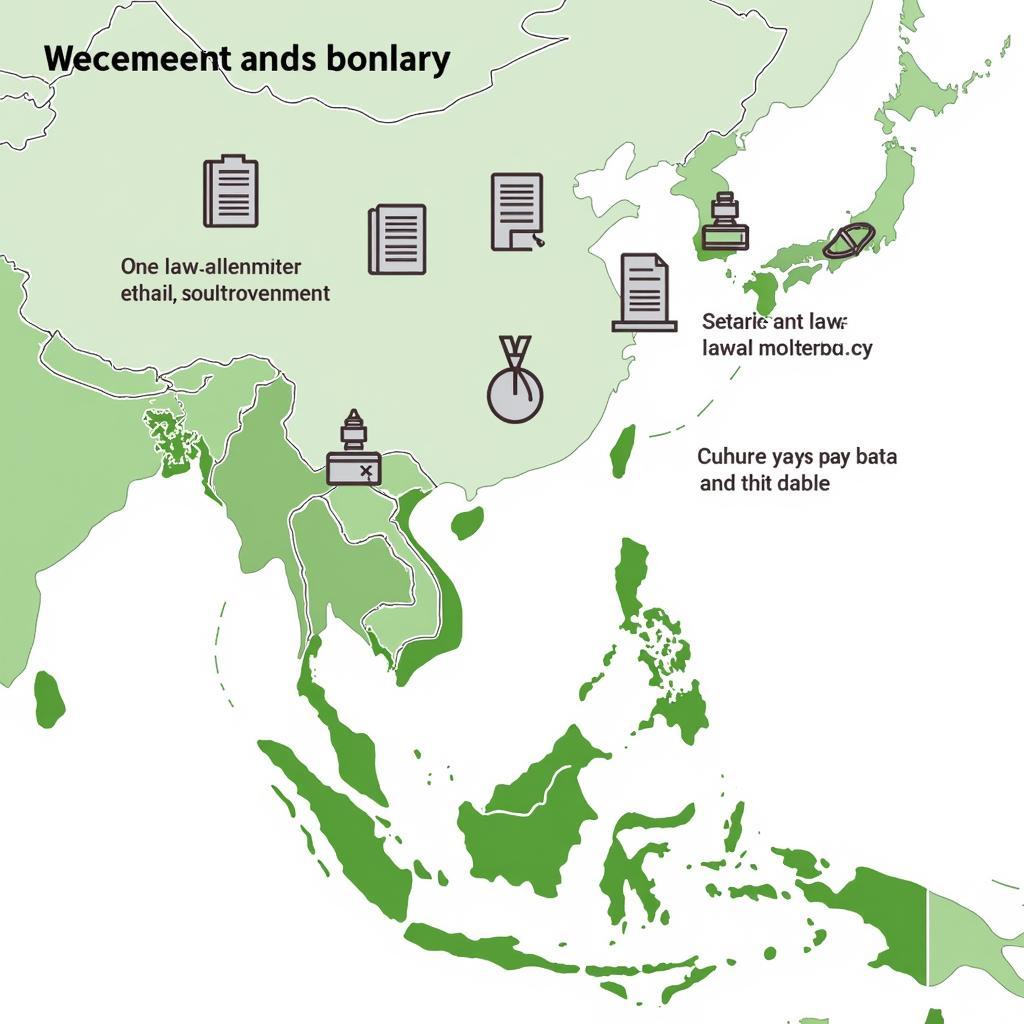The ASEAN legal department plays a crucial role in ensuring compliance and facilitating cross-border operations within the diverse Southeast Asian economic landscape. Understanding the intricacies of these departments is essential for businesses seeking to thrive in the region. This article will delve into the complexities of ASEAN legal departments, exploring their functions, challenges, and best practices.
Understanding the Role of an ASEAN Legal Department
An ASEAN legal department’s core function is to navigate the legal frameworks of the ten member states: Brunei, Cambodia, Indonesia, Laos, Malaysia, Myanmar, the Philippines, Singapore, Thailand, and Vietnam. This involves advising on a wide range of legal matters, from corporate governance and contract law to intellectual property and dispute resolution. They ensure that businesses operate within the bounds of local laws while also facilitating regional expansion and cross-border transactions.
Key Responsibilities of an ASEAN Legal Department
- Compliance: Ensuring adherence to local regulations and international standards.
- Contract Negotiation: Drafting and reviewing contracts to protect business interests.
- Dispute Resolution: Managing legal disputes and representing the company in legal proceedings.
- Intellectual Property Protection: Safeguarding trademarks, patents, and copyrights.
- Mergers and Acquisitions: Providing legal guidance during mergers, acquisitions, and joint ventures.
- Regulatory Affairs: Monitoring and interpreting changes in legislation and advising on compliance strategies.
 ASEAN Legal Department Compliance Meeting
ASEAN Legal Department Compliance Meeting
Challenges Faced by ASEAN Legal Departments
Operating across multiple jurisdictions presents unique challenges for ASEAN legal departments. These include:
- Diverse Legal Systems: Each ASEAN member state has its own unique legal system, often influenced by different legal traditions.
- Language Barriers: Navigating legal documents and communication in multiple languages can be complex.
- Cultural Differences: Understanding cultural nuances and their impact on legal practices is essential.
- Cross-Border Enforcement: Enforcing legal judgments across borders can be challenging.
 Navigating ASEAN Legal Challenges
Navigating ASEAN Legal Challenges
Best Practices for ASEAN Legal Departments
To effectively navigate the ASEAN legal landscape, departments should adopt best practices such as:
- Local Expertise: Engaging local legal counsel in each jurisdiction to ensure accurate interpretation of local laws and regulations. See asea global legal department.
- Building Strong Relationships: Establishing strong relationships with government agencies and regulatory bodies can facilitate smoother operations.
- Technology Adoption: Utilizing legal technology solutions for efficient document management, research, and communication.
- Continuous Learning: Staying updated on changes in legislation and legal practices across the region.
- Developing Clear Internal Policies: Implementing clear internal policies and procedures to ensure compliance across all operations. This could include policies related to asea brown boveri ein number for specific transactions.
Utilizing Specialized Legal Resources
For specific legal issues, specialized resources can be invaluable. For instance, if dealing with labor disputes, understanding ase deptartment of labor claims is critical. Similarly, a robust understanding of the general ase department structure and function can be beneficial. For specific payroll concerns, understanding ase maaş bordrosu becomes relevant.
Conclusion
The ASEAN legal department plays a vital role in navigating the dynamic and complex legal landscape of Southeast Asia. By understanding the challenges and adopting best practices, businesses can ensure compliance, mitigate risks, and successfully navigate the region’s diverse legal environment. A robust and well-informed ASEAN legal department is a key asset for any company seeking to thrive in this dynamic and growing region.
FAQ
- What is the primary function of an ASEAN legal department?
- What are the main challenges faced by ASEAN legal departments?
- What are some best practices for ASEAN legal departments?
- Why is local expertise important for ASEAN legal departments?
- How can technology assist ASEAN legal departments?
- What are the key legal considerations for businesses operating in ASEAN?
- What resources are available for companies needing assistance with ASEAN legal matters?
When you need support, please contact us via Phone: 0369020373, Email: aseanmediadirectory@gmail.com Or visit us at: Thôn Ngọc Liễn, Hiệp Hòa, Bắc Giang, Việt Nam. We have a 24/7 customer service team.


